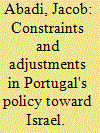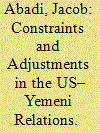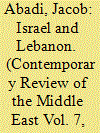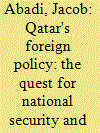| Srl | Item |
| 1 |
ID:
022966


|
|
|
|
|
| Publication |
Autumn 2002.
|
| Description |
616-641
|
|
|
|
|
|
|
|
|
|
|
|
|
|
|
|
| 2 |
ID:
020559


|
|
|
|
|
| Publication |
Sept 2001.
|
| Description |
563-587
|
|
|
|
|
|
|
|
|
|
|
|
|
|
|
|
| 3 |
ID:
057752


|
|
|
| 4 |
ID:
180317


|
|
|
|
|
| Summary/Abstract |
This article analyzes the course of US–Yemeni relations from the 1940s to the present and aims to explain the reasons for the twists and turns in bilateral relations. It argues that the US government never developed a unique “Yemen policy” and that its attitude toward that country was determined largely by its ties with Saudi Arabia. Yemen began to loom large in US foreign policy in the early 1960s when Egyptian President Gamal Abd al-Nasser intervened on behalf of the Republicans who staged a coup against the Royal imamate regime, which relied on Saudi support. The article shows that President John Kennedy looked favorably on the new Republican regime in Yemen despite the robust relations that existed between the United Statesand Saudi Arabia. In addition, it argues that despite the war in Yemen, which lasted from 1962 to 1970 and caused instability in this region, this country did not loom large in US foreign policy. This was largely due to the British presence in south Yemen and especially in the port of Aden, which lasted until 1967. The article shows how the British withdrawal from Aden increased Yemen’s value in the eyes of US policymakers, but even then, no effort was made to fashion a unique policy toward this country. In addition, the article demonstrates how Washington’s attitude changed in 1969 when the country was divided into North Yemen, which tended to regard the Soviet Union as its protector and South Yemen, which continued to rely on US aid. And lastly, the article traces US–Yemeni relations from 1990, when the country reunited, until the present. It demonstrates how the bilateral relations were affected by the superpowers’ rivalry during the Cold War, the fight against terrorism, and disagreement between the Republican and the Democratic parties in the United States.
|
|
|
|
|
|
|
|
|
|
|
|
|
|
|
|
| 5 |
ID:
068320


|
|
|
| 6 |
ID:
174369


|
|
|
|
|
| Summary/Abstract |
This article provides an analysis of the course of Israeli-Lebanese relations and its purpose is to shed light on the contacts between the Maronites in Lebanon and the State of Israel. It argues that the primary reason for the Maronites’ willingness to cooperate with the Jews was the fear that the rising tide of Arab nationalism in Lebanon would have adverse effects on their survival as a religious minority. Moreover, it demonstrates that these contacts laid the background for cooperation between the two communities which survived the vicissitudes of the Lebanese civil wars and still plays a role in Israeli foreign policy.
|
|
|
|
|
|
|
|
|
|
|
|
|
|
|
|
| 7 |
ID:
021284


|
|
|
|
|
| Publication |
Winter 2002.
|
| Description |
26-51
|
|
|
|
|
|
|
|
|
|
|
|
|
|
|
|
| 8 |
ID:
050621


|
|
|
|
|
| Publication |
London, Frank Cass Publishers, 2004.
|
| Description |
xxvi, 478p.
|
| Standard Number |
0714655767
|
|
|
|
|
|
|
|
|
|
|
|
Copies: C:1/I:0,R:0,Q:0
Circulation
| Accession# | Call# | Current Location | Status | Policy | Location |
| 047730 | 327.5694/ABA 047730 | Main | On Shelf | General | |
|
|
|
|
| 9 |
ID:
179888


|
|
|
| 10 |
ID:
174156


|
|
|
|
|
| Summary/Abstract |
This article provides an analysis of US-Lebanese relations and it concentrates on the US intervention in Lebanon in the late 1950s and again in the early 1980s. It makes the following arguments: (a). despite its role as a shelter-providing country the US had little regard for Lebanon’s security or economic welfare. Its policy was on most occasions based on considerations, which usually affected the entire Middle East region and not only Lebanon. (b). The US government never considered nor discussed the need to perpetuate Christian rule in Lebanon. Its spokesmen have often made statements which were misinterpreted by the Lebanese, particularly the Maronites among them who believed that they were nothing less than commitments to guarantee that they remain at the helm. (c.) Despite the impression that one obtains from the cordial statements made by both sides the bilateral ties had been often marred by numerous occasions of tension and discontent. (d). Lebanon’s quest for a shelter-providing power entailed major sacrifices and concessions that its leaders had to make in order to continue receiving the benefits which the US could provide.
|
|
|
|
|
|
|
|
|
|
|
|
|
|
|
|
| 11 |
ID:
051390


|
|
|
| 12 |
ID:
066601


|
|
|
| 13 |
ID:
164919


|
|
|
|
|
| Summary/Abstract |
The purpose of this article is to examine the evolution of Israel's relations with Saudi Arabia since the establishment of the Jewish state in 1948. The author explains how the major events in the Middle East affected Saudi Arabia's foreign policy orientation. It shows how Saudi Arabia's policy toward Israel was affected by the deterioration in Saudi-Egyptian relations, by its quest for security in the Arabian Gulf region and by its aspiration to hegemony in the Middle East. The author argues that Saudi Arabia's policy toward Israel remained far less hostile than that of the Arab states surrounding Israel. In addition, it argues that it was not until 1973 that Saudi Arabia became seriously involved in the attempt to pressure Israel to withdraw from the territories it occupied in the Six-Day War. The author concludes by showing that neither Saudi Arabia's acquisition of the intelligence-gathering AWACS aircraft, nor Israel's invasion of Lebanon or the massacre of Palestinians in the refugee camps of Sabra and Shatila had a serious impact on the bilateral relations, and that it was not until the emergence of the Iranian nuclear threat that Saudi Arabia's relations with Israel began to improve.
|
|
|
|
|
|
|
|
|
|
|
|
|
|
|
|
| 14 |
ID:
152600


|
|
|
|
|
| Summary/Abstract |
This article provides an analysis of the relations between Tunisia and Israel. The author argues that Israel's attempt to establish diplomatic relations with Tunisia was motivated largely by its quest to reach the countries in the periphery of the Middle East. In addition, the author argues the Israeli leaders were concerned about the fate of the Jewish community in Tunisia. At the same time, the Tunisian ruling Neo Destour party was motivated by the pragmatic considerations of its leader Habib Bourguiba who sought to pursue a unique policy towards Israel based on a willingness to recognize its existence and a just solution to the Palestinian question. Furthermore, the author argues that although the Tunisian regime criticized Israel for its occupation of Arab territories, the contacts between the two countries never ceased entirely. The bilateral connections reached their climax after 1993, when the Oslo accord between Israel and the Palestinians was signed. Despite the continuing tension, both sides remained interested in keeping the contacts and it was primarily Tunisia's concern for its tourism industry that kept it from severing its relations with Israel. The article also shows that Tunisia's Western orientation had a salutary effect on the bilateral relations.
|
|
|
|
|
|
|
|
|
|
|
|
|
|
|
|
| 15 |
ID:
183370


|
|
|
|
|
| Summary/Abstract |
This article examines the course of US-Syrian relations since the Six Day War of 1967 and it demonstrates how they began deteriorating as the Cold War between the superpowers intensified. The author argues that the bilateral relations were adversely affected by several factors that marginalized Syria’s image as a major player in the Middle East; Washington’s tendency to pay excessive attention to Soviet designs in the Middle East; the rise of pan-Arabism, which portrayed Egypt as a major threat to US interests in the region; the persistence of the Arab-Israeli conflict, and above all, the small size of the Syrian state and the weakness of its economy which prevented the American policy makers from courting its leaders.
|
|
|
|
|
|
|
|
|
|
|
|
|
|
|
|